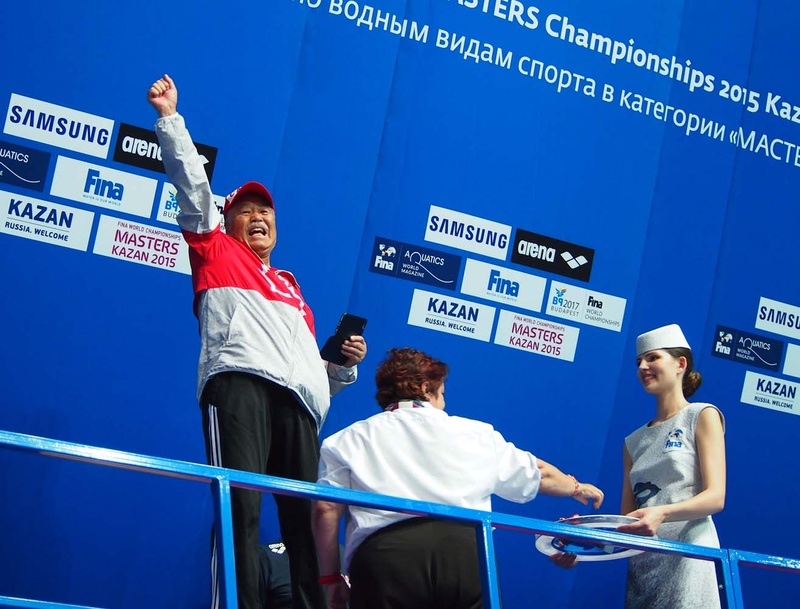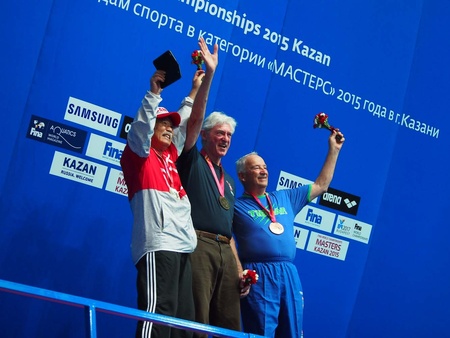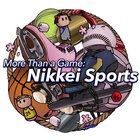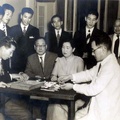I am 85 years old this year and have many memories from my more than half a century of life as an immigrant in Brazil, the United States, and Canada. The most memorable memory of my life was the sense of accomplishment I felt when I stood on the podium at the Masters World Championships in Kazan, the capital of the Republic of Tatarstan in the Russian Federation, at the age of 80. In Japan, I was a third-rate swimmer who almost always failed to qualify for regional competitions and only competed in the national championships twice, so it was like a dream for me to beat an Olympic medalist and stand on the podium at the World Championships.
In elementary school, I was a baseball player, and the Giants' catcher Fujio was the third batter, I was the fourth batter, and Nakata, who became the home run king at Hankyu, was the fifth batter, making us a strong team in the Hanshin Tigers. However, when I was in the first year of junior high school, my first baseman's mitt was stolen from my school, and I had to give up my dream of becoming a baseball player. Gloves were not manufactured in Japan just after the war, and a first baseman's mitt cost about one month's salary, so my father couldn't buy me another one. Because of this, the only sports I could do without money and with nothing but sumo and swimming were the only sports I could do, so I switched to swimming. If I had continued playing baseball, I would have only made it to Koshien at best, or at the six-university level, and I would never have been able to achieve success on the world's major stage. At the time, I hated the thief, but now I feel grateful to him.
During my 30 years working in the US, I was on overseas business trips 300 days a year, and I was so busy that I became a member of an airline mileage program with 2 million miles, so I didn't have time to swim. I retired at the age of 70, and I would literally be a couch potato if I just drank alcohol and watched TV, so I applied to a local masters swimming club in Toronto, and after waiting for a year until a spot became available, I was able to join.
In my student days, I did breaststroke, but in today's swimming world, you have to train in all four events, so I learned butterfly stroke at the age of 70. Although I had a gap of more than 40 years, in my first year, I won the gold medal in butterfly stroke at the Ontario Provincial Championships. Three years on from that, I became the Canadian champion in all events, including the individual medley.
Five years ago, in August 2015, we arrived at Kazan, the capital of Tatarstan, where the World Aquatics Championships and the Masters Aquatics World Championships were held simultaneously for the first time in history, at 3 a.m. Despite the warnings against photography posted everywhere at the airport, we were guided to the bus to the Athletes' Village through the immigration customs-free gate, ignoring the lines of people who were warned or arrested for taking out their digital cameras or smartphones. Because we had a humanitarian visa (cultural exchange visa) that was exempt from consular fees, we could only stay during the competition period and had to leave Russia the day after the final day. Since we arrived at the Athletes' Village accommodation before dawn, we checked in and went to the tennis academy across the road from the Athletes' Village for breakfast at 6:30, which was included in the accommodation fee. The national tennis school, which has produced world-class players such as Maria Sharapova, had luxurious facilities, and I was impressed that Kazan was the sports capital of Russia.
The next day, on the bus from the athletes' village to the swimming venue, I was seated next to a graduate student from the University of Tsukuba, Kaneko, who was competing in the World Championships and was a backstroke swimmer. I spent the first three days watching the World Championships, where current Olympic swimmers competed, and in the Masters Championships, he won a silver medal in the 50-meter breaststroke and a bronze medal in the 100-meter breaststroke.
Although I have not been able to overcome the effects of aging and my mind has started to deteriorate a little, my physical strength is still in good shape, so I intend to win gold medals at the World Masters Games (Olympics for age groups) to be held in Japan next year, the Kansai Championships (swimming in Kobe in May), and the World Masters Swimming Championships the year after next (swimming in Hakata in June), and bring glory to my hometown.
Finally, at the beginning of this year, I went to Brazil to relax my muscles by swimming in the sea in the morning, and participated in training at the sports club pool in the afternoon. I returned to Canada in perfect condition, but the Ontario Provincial Championships in Ottawa at the end of March were canceled, as were the Canadian Championships in Toronto in May, the Pan American Championships in Medellin, Colombia in June, and the Pan American Masters Games in Rio de Janeiro, Brazil in September. This year, as the youngest in the 85-89 age bracket, I was aiming to win a lot of gold medals, but all of them were for nothing. Currently, the state of emergency due to the coronavirus has not been lifted in Canada, the swimming club remains closed and I cannot train, and the pool at the apartment I live in is also closed, so it has been an unlucky year.
© 2020 Hideo Maruki






